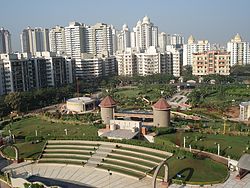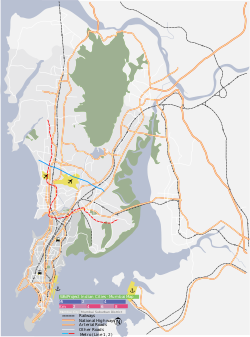Kandivli
Kandivali Khandolee | |
|---|---|
suburb | |
 Thakur Village in Kandivali (East) | |
| Coordinates: 19°12′16″N 72°50′16″E / 19.204511°N 72.837639°E | |
| Country | India |
| State | Maharashtra |
| District | Mumbai Suburban |
| City | Mumbai |
| Government | |
| • Type | Municipal Corporation |
| • Body | Brihanmumbai Municipal Corporation (MCGM) |
| Languages | |
| • Official | Marathi |
| Time zone | UTC+5:30 (IST) |
| PIN | 400067, 400101 |
| Area code | 022 |
| Vehicle registration | MH-47 |
| Lok Sabha constituency | Mumbai North |
| Vidhan Sabha constituency | Charkop Borivali (cover western parts of the suburb) Kandivali East Magathane (cover eastern parts of the suburb) |
Kandivali (Pronunciation: [kaːn̪d̪iʋəliː]) formerly Khandolee is a suburb in the north of Mumbai, Maharashtra, India and has a large Marathi, Koli, Gujarati population followed by others. British records highlight that the area names that end with "vali" are actual valleys through the small hills surrounding the area.
History
In the 16th century, Kandivali consisted of a number of villages including Kandivali (is also known as Kandol), BunderPakhadi Koliwada and Charkop. The other old settlements in Kandivali were villages occupied by the local community, East Indian Community, Bhandaris and Koli - who are recognized as the original native inhabitants of Mumbai, these communities are still living in Kandivali. Artifacts found near Kandivali indicate that the region was inhabited in the Stone Age.[1]
The Kandivali railway station was built more than 100 years ago in 1907, then known as Khandolee. The station derived its name from the East Indian village of Condolim. Earth and stones from Paran, a hillock east of the Kandivali railway station were quarried to reclaim the Bombay Backbay. On this account a railway line was opened, a workshop was erected, and a number of dwelling houses were constructed for officers and workmen numbering thousands.[2] The area around Western Urban Road between Malad and Kandivali had numerous stone quarries and was once famous for Malad Stone. Many heritage buildings in Mumbai were constructed with Malad stone between 1860 and 1930, most notable among them are David Sassoon library, Bombay House and the Western Railway building at Churchgate.
During the plagues of 1900s, the Fonseca's from Bandra migrated to Kandivali. They initially settled down to the east of Kandivali at Akurli and then moved to the west at Poisar.[3] This is where they thrived, and a few families still reside to this day. All the three major communities have their shrines in Poisar.
Landmarks and localities
The Church of Our Lady of Assumption, located off M.G. Road, was built in 1630[4] and was one of the oldest churches of Mumbai. The pond located at Shankar Mandir, Kandivali village is used for immersions during Ganesh Chaturthi. A 150-year-old shrine [5] to Shri Karsangli Akurli Mata, Varahi Mata Temple is at Shankar Lane. Holy Cross Chapel located in Bunder Pakhadi Koliwada, was built in 1907. Bunder Pakhadi Koliwada, is a fishing village there are Christian Koli & Hindu Koli more than 200 Families. This village is older than 400 years.[citation needed]
Kandivali West, together with Kandivali East, Charkop and Poisar, Mahavir Nagar, Thakur Village constitute the R-South ward of BMC.[6]


The Mahindra & Mahindra plant occupies a 63-acre (250,000 m2) built-up area and employs over 3,000.[7] Industrial complexes such as Akurli Industrial Estate in the east and Charkop Industrial Estate are in the western part. Kandivali is also home to The Times of India printing press.
The Sports Authority of India has a huge training ground for the popular football team Mahindra United.
Transportation
Kandivali railway station is a busy station on the Western Line of the Mumbai suburban railway. Poisar Bus Depot, one of the oldest BEST bus depot is located on S.V. Road in the western part of the neighbourhood. Road connectivity is provided by means of Western urban road on the east, S.V. Road and Link Road on the west. The BEST bus depot is close to the railway station on the eastern side of the neighbourhood and is the point of origin for localities in Kandivali (East) like Ashok Nagar, Hanuman Nagar, Damu Nagar, Samata Nagar, Thakur Village and Thakur Complex.[citation needed]
Two lines of Mumbai Metro (Line 2 and Line 7) pass through Kandivali. Line 2 passes through Link Road on the western part, Kandivli West and Dahanukarwadi are the metro stations, whereas Poisar and Akurli stations of Line 7 are situated on express highway i.e. eastern side of Kandivali.[8][9]
Line 7, once operational will be fully elevated and will run from Dahisar (East) to Andheri (East). Bandongri and Mahindra & Mahindra will be the two halts in Kandivali for the metro.[citation needed]
References
- ^ Ghosh, A. (1991). Encyclopedia of Indian Archaeology. Vol. 1. Brill Academic Publishers. ISBN 90-04-09264-1.
- ^ "The East Indians of Kandivli".
- ^ Jaisinghani, Bella (29 November 2015). "Family reunion of 440-year-old Fonseca clan in Bandra today". The Times of India. Retrieved 11 February 2019.
- ^ "The East Indian Community". Retrieved 27 December 2009.
- ^ Bombay Gazettor's records, vol. XIV, 1882
- ^ "Posh addresses, poor amenities". Times of India. Retrieved 22 December 2014.
- ^ "Mahindra & Mahindra Manufacturing Plants". Retrieved 27 December 2009.
- ^ "Yellow Line Metro Route of Mumbai | Line 2A & Line 2B". Magicbricks.
- ^ "Western Express Highway Metro Station, Mumbai - Route, Map, Location & Nearby Places". Magicbricks.



